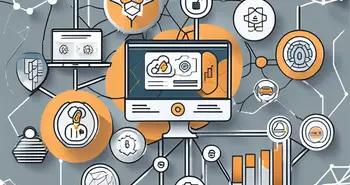An Overview of Decentralised Finance (DeFi)

Decentralised Finance, commonly referred to as DeFi, is a concept that has been gaining significant attention in recent years. As an expert in the field, I am excited to share with you an in-depth overview of DeFi, its basic principles, evolution, components, benefits, as well as the challenges and risks it presents.
Understanding the Basics of Decentralised Finance
The Concept of DeFi
DeFi refers to a financial system that operates on a decentralised network rather than relying on traditional intermediaries like banks. It leverages blockchain technology and smart contracts to provide individuals with direct control over their financial activities. This eliminates the need for intermediaries, reduces costs, and increases transparency and security.
Imagine a world where you can manage your finances without the need for a bank or any other middleman. This is the essence of decentralised finance, or DeFi. By leveraging blockchain technology, DeFi allows individuals to take control of their financial activities, making transactions and managing assets directly on a decentralised network.
One of the key advantages of DeFi is its ability to eliminate intermediaries. In traditional finance, banks and other financial institutions act as intermediaries, facilitating transactions and managing funds on behalf of individuals. However, this reliance on intermediaries often comes with high fees, long processing times, and limited transparency.
With DeFi, these intermediaries are no longer necessary. Instead, transactions are executed through smart contracts, which are self-executing agreements with the terms of the transaction directly written into code. These smart contracts are stored on a blockchain, a decentralised and immutable ledger that ensures transparency and security.
Key Principles of Decentralised Finance
There are several key principles that underpin DeFi:
- Openness: DeFi protocols are open-source, allowing anyone to access and inspect the code for transparency and trust.
- Interoperability: DeFi platforms can interact with one another, allowing for seamless integration and collaboration.
- Permissionless: DeFi applications do not require permission or approval from any central authority, enabling anyone to participate.
- Security: DeFi employs advanced cryptographic techniques to ensure the safety of user funds and transactions.
Openness is a fundamental principle of DeFi. By making the protocols open-source, developers and users can access and inspect the code, ensuring transparency and trust. This allows for community-driven development and innovation, as anyone can contribute to the improvement of the protocols.
Interoperability is another key principle of DeFi. Unlike traditional financial systems that operate in silos, DeFi platforms can interact with one another. This means that users can seamlessly move assets and data between different DeFi applications, creating a more integrated and efficient financial ecosystem.
One of the most revolutionary aspects of DeFi is its permissionless nature. Unlike traditional finance, which often requires individuals to go through a lengthy approval process to access financial services, DeFi applications are open to anyone. This means that individuals who are unbanked or underbanked can participate in the financial system and access services that were previously out of reach.
Security is of utmost importance in DeFi. As the financial activities are executed through smart contracts on a blockchain, advanced cryptographic techniques are employed to ensure the safety of user funds and transactions. These techniques include encryption, digital signatures, and consensus mechanisms that prevent fraudulent activities and protect the integrity of the system.
In conclusion, decentralised finance (DeFi) is a financial system that operates on a decentralised network, leveraging blockchain technology and smart contracts. It offers individuals direct control over their financial activities, eliminating the need for intermediaries, reducing costs, and increasing transparency and security. With key principles of openness, interoperability, permissionlessness, and security, DeFi is revolutionising the way we think about and interact with finance.
The Evolution of DeFi
The Birth of DeFi
The inception of DeFi can be traced back to the launch of Ethereum in 2015, which introduced the concept of smart contracts. Smart contracts enabled the creation of programmable financial applications, leading to the development of various DeFi protocols and platforms.
With the introduction of smart contracts, developers and entrepreneurs saw the potential to revolutionize the traditional financial system. They recognized that by leveraging blockchain technology, they could create decentralized financial applications that would eliminate the need for intermediaries and provide users with greater control over their assets.
As the Ethereum network gained traction, the first DeFi projects started to emerge. These early pioneers focused primarily on creating decentralized exchanges, allowing users to trade cryptocurrencies directly without relying on centralized intermediaries. This marked the beginning of the DeFi revolution.
Current State of DeFi
Today, DeFi has experienced tremendous growth, with a wide range of applications offering services such as lending, borrowing, trading, and yield farming. The total value locked in DeFi protocols has skyrocketed, attracting both institutional and retail investors seeking new opportunities in the digital asset space.
One of the key drivers of DeFi's growth has been the development of decentralized lending platforms. These platforms allow users to lend and borrow digital assets without the need for a traditional financial institution. By leveraging smart contracts, these platforms automate the lending process, eliminating the need for intermediaries and reducing costs.
Another significant development in the DeFi space is the rise of decentralized exchanges (DEXs). These platforms enable users to trade cryptocurrencies directly with one another, without relying on a centralized exchange. DEXs offer increased privacy, security, and control over funds, making them an attractive alternative to traditional exchanges.
Yield farming has also gained popularity within the DeFi ecosystem. Yield farming involves users providing liquidity to decentralized protocols in exchange for rewards. These rewards can come in the form of additional tokens or fees generated by the protocol. Yield farming has become a way for users to earn passive income by leveraging their existing crypto holdings.
Furthermore, the DeFi space has seen the emergence of synthetic assets, which are digital representations of real-world assets. These synthetic assets allow users to gain exposure to traditional financial instruments, such as stocks, commodities, and fiat currencies, without actually owning them. This opens up new investment opportunities and provides users with greater flexibility in managing their portfolios.
As DeFi continues to evolve, new protocols and applications are being developed to address the challenges and limitations of the current ecosystem. These innovations aim to improve scalability, security, and user experience, further expanding the possibilities of decentralized finance.
Components of DeFi
Decentralized Finance (DeFi) is a rapidly growing sector within the blockchain industry that aims to revolutionize traditional financial systems. It encompasses various components that work together to provide users with a decentralized and transparent financial ecosystem.
Blockchain and DeFi
Blockchain technology forms the foundation of DeFi. It is a distributed ledger that records all transactions and interactions within the network. By leveraging blockchain, DeFi platforms ensure immutability, transparency, and security of financial activities.
Blockchain technology enables the creation of a decentralized infrastructure where financial transactions can be conducted without the need for intermediaries. This eliminates the reliance on centralized authorities, such as banks or financial institutions, and empowers individuals to have full control over their funds.
Moreover, blockchain's decentralized nature ensures that no single entity has control over the network, making it resistant to censorship and manipulation. This provides users with a high level of trust and confidence in the DeFi ecosystem.
Smart Contracts in DeFi
Smart contracts are self-executing contracts with predefined rules encoded on the blockchain. In DeFi, they automate and enforce financial agreements between parties, eliminating the need for intermediaries. Smart contracts enable decentralized lending, borrowing, and the creation of decentralized exchanges.
With the use of smart contracts, DeFi platforms can facilitate peer-to-peer transactions without the involvement of third parties. These contracts automatically execute the terms of an agreement once the predefined conditions are met, ensuring that transactions are carried out in a secure and transparent manner.
Decentralized lending platforms, for example, utilize smart contracts to enable individuals to lend and borrow funds directly from one another. These contracts define the terms of the loan, including interest rates and repayment schedules, and automatically enforce them without the need for a traditional lender.
Additionally, smart contracts are the building blocks for decentralized exchanges, where users can trade digital assets directly with one another. These exchanges eliminate the need for a central authority to facilitate trades, providing users with greater control over their assets and reducing the risk of hacking or theft.
Overall, smart contracts play a crucial role in DeFi by enabling the automation of financial processes and ensuring the trustworthiness of transactions within the decentralized ecosystem.
Benefits of Decentralised Finance
Financial Inclusion and DeFi
One of the key benefits of Decentralised Finance (DeFi) is its potential to provide financial services to the unbanked and underbanked populations worldwide. By removing the need for traditional intermediaries, such as banks or financial institutions, DeFi opens up access to financial services for individuals who were previously excluded from the traditional banking system.
This increased financial inclusion can have a significant impact on the lives of millions of people. For example, in developing countries where access to banking services is limited, DeFi can empower individuals to save, invest, and access credit. This, in turn, can help them start businesses, improve their living conditions, and break the cycle of poverty.
Moreover, DeFi can also benefit individuals in developed countries who may have limited access to traditional banking services due to various reasons, such as a lack of credit history or high fees associated with maintaining a bank account. With DeFi, these individuals can now participate in the global financial system, manage their finances, and access a wide range of financial products and services.
Transparency and Security in DeFi
DeFi platforms are built on blockchain technology, which ensures transparency by making all transactions and interactions publicly verifiable. Unlike traditional financial systems, where transactions are often hidden behind closed doors, DeFi allows anyone to view and audit the entire transaction history.
This transparency not only promotes trust but also helps prevent fraudulent activities. With every transaction being recorded on the blockchain, it becomes extremely difficult for bad actors to manipulate or alter the data. This level of transparency can bring a new level of accountability to the financial industry, reducing the risk of fraud and corruption.
In addition to transparency, DeFi also offers enhanced security through the use of smart contracts. Smart contracts are self-executing contracts with the terms of the agreement directly written into code. Once the conditions specified in the contract are met, the contract automatically executes without the need for intermediaries.
Smart contracts are tamper-proof and resistant to fraud, as they are executed based on predefined rules and cannot be altered by any party once deployed on the blockchain. This eliminates the need for trust in a central authority, as the code itself ensures the execution of the contract. As a result, individuals can have greater confidence in their financial transactions and interactions within the DeFi ecosystem.
Furthermore, the use of blockchain technology in DeFi also provides an additional layer of security against hacking and data breaches. Unlike centralized systems where a single point of failure can compromise the entire system, DeFi platforms are decentralized and distributed across a network of computers. This makes it extremely difficult for hackers to attack the system, as they would need to compromise a majority of the network's nodes simultaneously.
In conclusion, the benefits of Decentralised Finance (DeFi) extend beyond financial inclusion and transparency. DeFi has the potential to revolutionize the global financial system by providing individuals with greater control over their finances, promoting trust and accountability, and enhancing security in financial transactions. As the DeFi ecosystem continues to evolve and mature, it is expected to unlock new opportunities and reshape the way we access and interact with financial services.
Challenges and Risks in DeFi
Technical Risks in DeFi
DeFi is still a relatively new field, and as such, it faces technical challenges. Smart contract vulnerabilities, such as coding errors or security loopholes, can expose users to financial losses. Furthermore, scalability and interoperability issues need to be addressed to support the growing demand for DeFi applications.
Regulatory Challenges for DeFi
As DeFi grows in popularity, regulators across the globe are grappling with how to regulate this new financial landscape. The decentralised nature of DeFi poses challenges in terms of compliance, consumer protection, and the prevention of illicit activities. Striking a balance between innovation and regulation is crucial for the long-term success of DeFi.
Being an expert in the field of DeFi, I have personally witnessed the transformation it has brought to the financial industry. It is both exciting and empowering to see individuals taking control of their finances and participating in a more inclusive and transparent ecosystem.
As a piece of advice, I would urge individuals interested in DeFi to conduct thorough research, understand the risks involved, and only invest what they can afford to lose. While DeFi presents incredible opportunities, it is essential to approach it with caution and make informed decisions.
Frequently Asked Questions (FAQ)
1. What is DeFi?
DeFi stands for Decentralised Finance and refers to a financial system that operates on a decentralised network using blockchain technology and smart contracts.
2. What are the key principles of DeFi?
The key principles of DeFi include openness, interoperability, permissionless nature, and enhanced security.
3. How did DeFi evolve?
The birth of DeFi can be attributed to the launch of Ethereum and the introduction of smart contracts. Since then, DeFi has grown exponentially, offering a wide range of financial services.
4. How does DeFi benefit users?
DeFi offers financial inclusion by providing services to the unbanked and underbanked populations. It also enhances transparency and security in financial transactions.
5. What are the challenges and risks in DeFi?
DeFi faces technical challenges such as smart contract vulnerabilities and scalability issues. Moreover, regulatory challenges arise due to the decentralised nature of DeFi.
In conclusion, Decentralised Finance (DeFi) has revolutionized the financial landscape by offering individuals greater control over their finances and democratizing access to financial services. While it presents immense potential, it is crucial to remain aware of the risks and to approach DeFi with caution. As an expert in the field, I believe that DeFi will continue to evolve, shaping the future of finance for years to come.
Ready to embrace the future of finance with DeFi? Discover Morpher.com, a revolutionary trading platform that embodies the principles of Decentralised Finance. With Morpher, you can trade across a multitude of asset classes, including stocks, crypto, and more, without any fees. Experience the benefits of fractional investing, short selling, and up to 10x leverage, all while maintaining full control over your funds with the Morpher Wallet. As you step into this new era of investing, Sign Up and Get Your Free Sign Up Bonus to begin your journey with Morpher, where innovation meets trading.

Disclaimer: All investments involve risk, and the past performance of a security, industry, sector, market, financial product, trading strategy, or individual’s trading does not guarantee future results or returns. Investors are fully responsible for any investment decisions they make. Such decisions should be based solely on an evaluation of their financial circumstances, investment objectives, risk tolerance, and liquidity needs. This post does not constitute investment advice.

Painless trading for everyone
Hundreds of markets all in one place - Apple, Bitcoin, Gold, Watches, NFTs, Sneakers and so much more.

Painless trading for everyone
Hundreds of markets all in one place - Apple, Bitcoin, Gold, Watches, NFTs, Sneakers and so much more.









